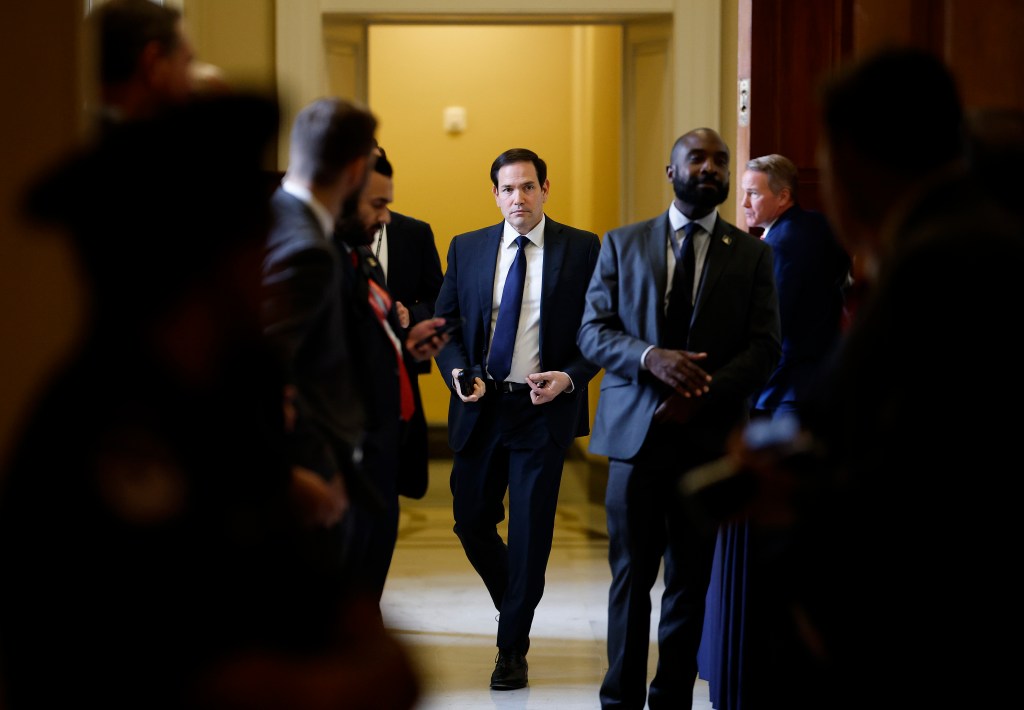
On Wednesday evening, the Republican-controlled Senate rejected a resolution to stop President Donald Trump and his administration from conducting military strikes on suspected drug-carrying boats in the Caribbean Sea. But the resolution’s failure does not mean GOP senators are ready to fully support the fatal attacks.
Since the White House began targeting the small vessels, which it alleges are being used by South American gangs to smuggle drugs into the United States, questions have arisen from both Democrats and Republicans about the legal and ethical basis of the strikes, not to mention whether the U.S. has sufficient intelligence to justify them. Earlier this year, the administration designated the drug cartels as foreign terrorist organizations, and more recently has argued that they are enemy combatants with whom the U.S. is in a “noninternational armed conflict,” meaning a conflict with nonstate actors.
Concerns about the legality of the strikes that began last month prompted Democratic Sens. Adam Schiff of California and Tim Kaine of Virginia to introduce a resolution—aimed at requiring the president to get Congress’ permission before launching more strikes—under the War Powers Act, which allows Congress to assert its constitutional authority on military action and stop the president from taking such action without its approval.
The two Democrats used Senate privileges to force a vote on the resolution, but it failed 48-51. Still, it sparked a discussion about the strikes among Republican senators, some of whom have talked publicly about their misgivings over the campaign. Two Republicans voted for the resolution: moderate Sen. Lisa Murkowski of Alaska and Sen. Rand Paul of Kentucky, a libertarian well-known for favoring restrained use of the military. Paul wants the administration to show that it knew specifically whom it was targeting before launching the four strikes, which have killed at least 21 people.
“Who are the 11 people that were killed in the first boat? Who are the other four [killed in the most recent strike]?” Paul asked as he spoke to reporters. “If they’re members of a gang, [if] you know them to be terrorists, and you’re convinced enough to kill them, shouldn’t you know their names?”
But even among those who voted against the resolution, questions remained about the strikes, their legality, and the intelligence that led to them. Sen. Kevin Cramer of North Dakota, a member of the Senate Armed Services Committee, said the legal argument the administration used to justify the attacks at an October 1 briefing he attended had “plausibility,” but he also wanted more information from intelligence and military officials.
“I would certainly like to see the intel more directly, firsthand,” he told The Dispatch. “I’d at least like to talk to the intel community. They were not present at the briefing, nor was anybody from Southern Command. The people that briefed were fine, and I think their case is fine, but I’d be more comfortable defending the administration if they shared the information.”
On Wednesday night, the Associated Press reported that the administration had yet to give “hard evidence” to members of Congress that the boats were, in fact, carrying drugs.
Sen. Todd Young of Indiana voted “no” on Wednesday’s measure, objecting to the wording of the resolution and arguing that, as currently written, it could “potentially prohibit” military actions against radical Islamic terror groups in the Middle East. (Kaine denied that claim when asked about it by The Dispatch.) Still, Young was clear that his opposition to the resolution in no way indicated support for the strikes.
“I am highly concerned about the legality of recent strikes in the Caribbean and the trajectory of military operations without congressional approval or debate and the support of the American people,” he said in a statement posted to X after the vote. “While the Constitution grants Article II authorities to the executive branch to defend against imminent threats, Congress alone is entrusted with decisions of war and peace.”
In his statement, Young also raised questions about some of the side effects of the strikes. “Others have noted that, if one thinks of the ‘War on Drugs’ as a real war, it could conceivably lead to an increasingly militarized ‘War on Drugs’ inside the United States,” he said. “The American people, through their representatives, deserve more information about the threats we face in the region and the role of America’s military going forward.” He added that Secretary of Defense Pete Hegseth and Secretary of State Marco Rubio had committed to discuss his concerns with him “in the coming days.” Young also requested that the Senate Foreign Relations Committee schedule a hearing on the matter.
Each Senate conference usually holds closed-door lunches several times a week when the chamber is in session, and Rubio attended the Republican gathering on Wednesday to discuss the strikes. “He just explained why they’re doing what they’re doing,” said Sen. Rick Scott of Florida, adding his former colleague was “very persuasive.”
But even after the lunch some senators still had questions, including Sen. Mike Rounds of South Dakota, who sits on both the Armed Services and Intelligence Committees and wondered about the legal advice the White House received.
“We just wanted to see what their attorneys had told them,” Rounds said. “That was to be delivered to us in a classified setting. I haven’t got that [information] yet.”
But other senators say they have learned enough about the strikes and are behind them. Idaho Sen. Jim Risch, an Intelligence Committee member like Rounds who also serves as the chairman of the Foreign Relations Committee, is satisfied with what has been shared by the administration.
“I know all about this, and they have been absolutely transparent in what they have done, in what they knew, when they knew it, what they destroyed,” he said. “I support 100 percent what they’re doing, and I believe most American people would feel the same way when they knew how many lives were being saved because they kept these poison drugs out of the country.”
Still, the voices clamoring for Trump to keep Congress better informed about the strikes are noticeable. Sen. Thom Tillis of North Carolina said he did not support the resolution because he was not fond of “messaging votes,” but he added that he expected the Trump administration to tell Congress more in a classified setting. He said he hoped the White House possessed the same quality of “exquisite intelligence” that it did to justify the 2020 killing of Qassem Suleimani, then the head of the Iranian Revolutionary Guard Corps.
“If they don’t, I think it raises a broader question about safety in international waters,” he told The Dispatch. “I mean, if the United States can forgo due process and intelligence gathering, then we kind of have a race to the bottom in terms of other nation states that may do the same thing.”

















